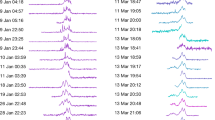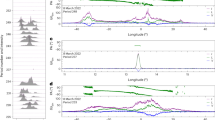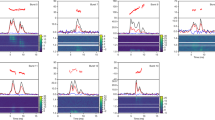Abstract
WE have reported earlier1 on the reception at low radio frequencies of radio pulses from three pulsars. A similar method2 was used during 1973–74, and four more pulsars were detected.
This is a preview of subscription content, access via your institution
Access options
Subscribe to this journal
Receive 51 print issues and online access
$199.00 per year
only $3.90 per issue
Buy this article
- Purchase on Springer Link
- Instant access to full article PDF
Prices may be subject to local taxes which are calculated during checkout
Similar content being viewed by others
References
Bruck, Yu. M., and Ustimenko, B. Yu., Nature phys. Sci., 242, 58 (1973).
Bruck, Yu. M., and Ustimenko, B. Yu., Radiofizika, 16, N 12 (1973).
Bruck, Yu. M., and Ustimenko, B. Yu., Theses of the Reports presented at the All-Union Conference on Radioastronomy, Puschino (1975).
Rickett, B. J., and Lyne, A. G., Nature, 218, 934 (1968).
Lyne, A. G., Smith, P. G., and Graham, D. A., Mon. Not. R. astr. Soc., 153, 337 (1971).
Author information
Authors and Affiliations
Rights and permissions
About this article
Cite this article
BRUCK, Y., USTIMENKO, B. Decametric radio emission from four pulsars. Nature 260, 766–767 (1976). https://doi.org/10.1038/260766a0
Received:
Accepted:
Published:
Issue Date:
DOI: https://doi.org/10.1038/260766a0
This article is cited by
-
The modern radio astronomy network in Ukraine: UTR-2, URAN and GURT
Experimental Astronomy (2016)
-
Farside explorer: unique science from a mission to the farside of the moon
Experimental Astronomy (2012)
-
Pulsar observations at decametric wavelengths using a swept-frequency dedisperser
Journal of Astrophysics and Astronomy (1994)
-
Pulsar observations at 34.5 MHz using the Gauribidanur Telescope: I
Journal of Astrophysics and Astronomy (1992)
-
Pulsar interpulses and other off-pulse emission
Nature (1977)
Comments
By submitting a comment you agree to abide by our Terms and Community Guidelines. If you find something abusive or that does not comply with our terms or guidelines please flag it as inappropriate.



